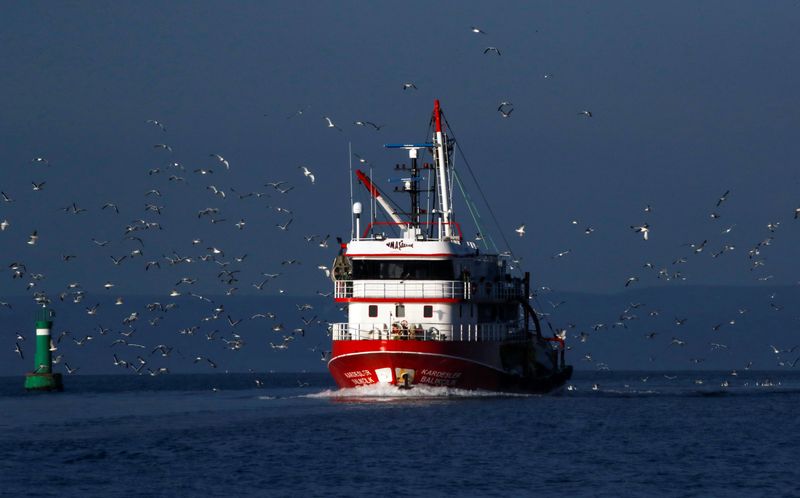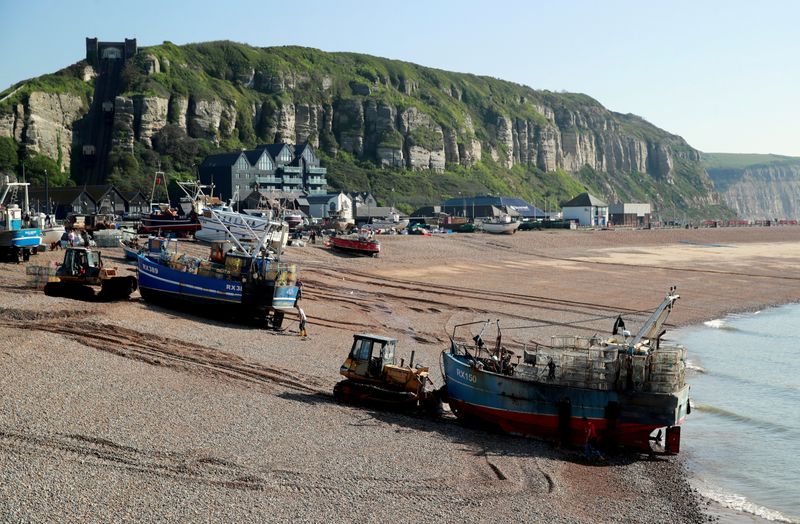LONDON (Reuters) – Global commercial fishing activity for 2020 fell by around 1 million hours as of end-April, a 6.5% decline over the two previous years, the result of plummeting demand caused by coronavirus lockdowns, according to Global Fishing Watch.
Fishing fleets spent 14.4 million hours on the water for the year so far to April 28, a decline from an average of 15.4 million hours for the same year-to-date periods of 2018 and 2019, according to the nonprofit organization that tracks fishing operation worldwide.
Global Fishing Watch collects and analyses data from onboard identification systems known as AIS, which is used by large ships to broadcast their position and avoid collisions.
The closures of many hotels and restaurants – a large market sector for fisheries – and the logistical challenge of accessing necessary port services contributed to declining prices and plummeting demand, said Tyler Clavelle, a data scientist at Global Fishing Watch.
Much of the drop can be traced to China. While China’s industrial fleet started January more active than years past, there was a large drop after the Lunar New Year holiday in late January. For the two months to March 25, China’s fishing activities fell by 1.2 million hours, a 40% percent drop from the average for the same period the previous two years.
By mid-March, though, activity by the Chinese fleet – responsible for 20% of the global catch each year – had recovered to a level comparable with previous years, according to Global Fishing Watch.
In Europe, fishing activity was down by more than 50% for multiple weeks in a row in France, Spain, Portugal and Italy.
In the United Kingdom, fishing activity for 2020 so far was down 26% as of April 28 compared with the averages for the past two years, or about 100,000 fewer fishing hours, the data shows.
Some small-scale fisheries have been harder hit. Fishing is considered essential food production in many countries, but seafood markets have been closed as part of lockdown measures, leaving fishers few options for selling their catch.
John Worthington, 54, is one of a handful of fishers left in Fleetwood, a small coastal town in northwest England. The fishing season typically begins just before Easter, he said, but this year fish markets are closed until further notice.
Instead of catching sole and dogfish, Worthington is repairing his 10-metre trawler, Mi-Amor.
“There’s a lot of money just sat in that harbour, doing nothing,” he said.
It is the same story in southeast England, where Graham Doswell, 65, runs his 10-metre trawler off the coast of Eastbourne. Prices for fish and shellfish are one-third of what they should be, he said, but insurance and fuel prices have stayed the same. Doswell and his two-person crew switched to setting cuttlefish traps to save on fuel costs.
Doswell, who also runs the Eastbourne Fisherman Community Interest Company, said he hopes the pandemic will encourage people to value local fish more.
“Rather than people always relying on going to the supermarket, they can actually go to the quayside and buy something directly from the boats.”
(Reporting by Reade Levinson; Editing by Ryan McNeill, Matthew Lewis and Tom Hogue)




















